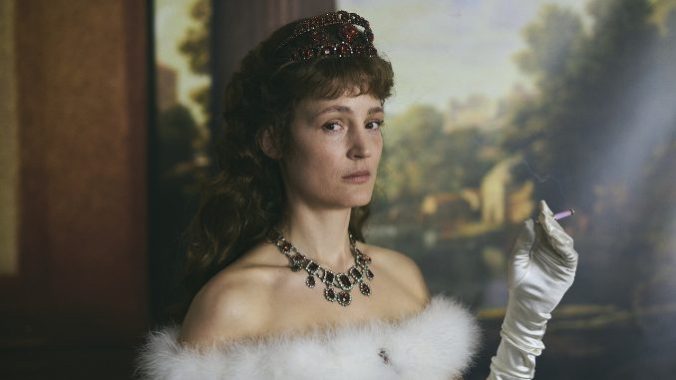Empathetic Character Study Corsage Humanizes Empress Elisabeth of Austria

Empress Elisabeth of Austria and Queen of Hungary is often regarded as more of a beautiful enigma than an actual human being. In crowded Viennese souvenirs shops, she is a still portrait plastered on postcards, magnets and tea cups, a quiet relic of Imperial Austria. In 1950s cinema, she is a magnetic young royal whose life would be transfigured into a fairytale-like trilogy that brought comfort and escapism to a postwar Europe. In 1968’s Mayerling, she is femme-fatale-tinged mother whose devastating loss (the apparent murder-suicide of her only son Rudolf, Crown Prince of Austria, and his lover Baroness Mary Vetsera) would rake in millions at the box office. Be it through Viennese court gossip or a myriad of posthumous period dramas, the intimate details of Empress Elisabeth’s life—her physical appearance, her all-consuming eating disorder, her tragic experiences as a mother, her unhappiness with royal life—have routinely provided the world with bewilderment and amusement. Rarely, though, have they inspired the sort of empathetic character study present in Marie Kreutzer’s Corsage.
Set between December 1877 and October 1878, the film refreshingly opts to paint a more pointed portrait of the royal, one that tackles a short but pivotal 11-month period of her life at the turn of her 40th birthday. Notably, Corsage’s protagonist is not a 17-year-old Romy Schneider, nor an immaculately made-up Ava Gardner, but a melancholy Vicky Krieps on the brink of losing herself in an internal abyss of depression and purposelessness.
Because so much of her public persona has been tied to her physical appearance, Elisabeth, now a woman who has reached the life expectancy of her female subjects, struggles to find meaning in her royal duties (which limit her to nothing more than mere arm candy for Franz Joseph, played by Florian Teichtmeister). At first, the “aging” queen attempts to cling to the glory of her youth, adhering to a strict diet of paper-thin orange slices and clear beef broth. But as the film progresses, she enacts a series of quiet rebellions in search of fulfillment elsewhere—finding small joys in midnight swims, a change of hairstyle and a good cigarette.
What makes Corsage a standout from other Sisi depictions is that writer/director Kreutzer isn’t interested in the boring dichotomy of hero or villain: Though the film doesn’t refrain from depicting Sisi’s occasional cruelness towards her ladies-in-waiting or her inability to connect with her young daughter Valerie (Rosa Hajjaj), it isn’t out to frame her as a spoiled royal brat. Conversely, its interest in her struggle as a woman in a patriarchal system isn’t meant to turn her into some perfect feminist icon. What the film is intent on is humanizing the very complicated Duchess Elisabeth Amalie Eugenie of Bavaria (and occasionally relieving her from her suffocating corset).
-

-

-

-

-

-

-

-

-

-

-

-

-

-

-

-

-

-

-

-

-

-

-

-

-

-

-

-

-

-

-

-

-

-

-

-

-

-

-

-








































